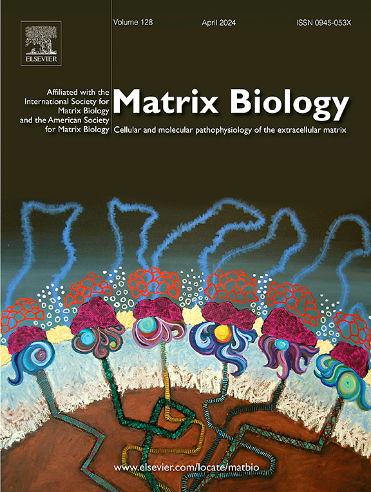细胞外基质完整性调节海马的 GABA 能可塑性
IF 4.5
1区 生物学
Q1 BIOCHEMISTRY & MOLECULAR BIOLOGY
引用次数: 0
摘要
大脑细胞外基质(ECM)对神经回路功能、突触可塑性和学习至关重要。虽然 ECM 在兴奋性突触中的作用已被广泛研究,但它对抑制性突触的影响,尤其是对 GABA 能长期可塑性的影响,仍然知之甚少。本研究旨在阐明 ECM 成分对海马 CA1 区抑制性突触传递和可塑性的影响。我们重点研究了硫酸软骨素蛋白多糖(CSPGs)和透明质酸在调节抑制性突触后电流(IPSCs)中的作用,这两个不同的抑制性突触是由体节蛋白(SST)阳性和副发光素(PV)阳性的中间神经元形成的,它们连接到锥体细胞(PCs)上。通过对脑片进行光遗传刺激,我们观察到透明质酸酶或软骨素酶-ABC 对 ECM 成分的急性降解不会影响基础抑制性突触传递。然而,经过酶处理后,PV→PC 突触的短期可塑性,尤其是爆发诱导的抑制作用得到了增强。长期可塑性实验表明,CSPGs 是 SST→PC 突触上 NMDA 诱导的 iLTP 所必需的,而透明质酸酶消化透明质酸会损害 PV→PC 突触上的 iLTP。这表明 CSPGs 和透明质酸在调节 GABA 能可塑性中具有突触特异性作用。此外,我们还报告了在长时间应用 NMDA 诱导的 PV→PC 突触中存在隐性 GABA 能可塑性,这种可塑性在 CSPG 消化后变得明显,而在对照条件下则不存在。我们的研究结果强调了 ECM 降解对抑制性突触可塑性的不同影响,突出了 ECM 成分与特定 GABA 能突触之间的相互作用。这为学习和关键期时间的研究提供了新的视角。本文章由计算机程序翻译,如有差异,请以英文原文为准。
Extracellular matrix integrity regulates GABAergic plasticity in the hippocampus
The brain's extracellular matrix (ECM) is crucial for neural circuit functionality, synaptic plasticity, and learning. While the role of the ECM in excitatory synapses has been extensively studied, its influence on inhibitory synapses, particularly on GABAergic long-term plasticity, remains poorly understood. This study aims to elucidate the effects of ECM components on inhibitory synaptic transmission and plasticity in the hippocampal CA1 region. We focus on the roles of chondroitin sulfate proteoglycans (CSPGs) and hyaluronic acid in modulating inhibitory postsynaptic currents (IPSCs) at two distinct inhibitory synapses formed by somatostatin (SST)-positive and parvalbumin (PV)-positive interneurons onto pyramidal cells (PCs). Using optogenetic stimulation in brain slices, we observed that acute degradation of ECM constituents by hyaluronidase or chondroitinase-ABC did not affect basal inhibitory synaptic transmission. However, short-term plasticity, particularly burst-induced depression, was enhanced at PV→PC synapses following enzymatic treatments. Long-term plasticity experiments demonstrated that CSPGs are essential for NMDA-induced iLTP at SST→PC synapses, whereas the digestion of hyaluronic acid by hyaluronidase impaired iLTP at PV→PC synapses. This indicates a synapse-specific role of CSPGs and hyaluronic acid in regulating GABAergic plasticity. Additionally, we report the presence of cryptic GABAergic plasticity at PV→PC synapses induced by prolonged NMDA application, which became evident after CSPG digestion and was absent under control conditions. Our results underscore the differential impact of ECM degradation on inhibitory synaptic plasticity, highlighting the synapse-specific interplay between ECM components and specific GABAergic synapses. This offers new perspectives in studies on learning and critical period timing.
求助全文
通过发布文献求助,成功后即可免费获取论文全文。
去求助
来源期刊

Matrix Biology
生物-生化与分子生物学
CiteScore
11.40
自引率
4.30%
发文量
77
审稿时长
45 days
期刊介绍:
Matrix Biology (established in 1980 as Collagen and Related Research) is a cutting-edge journal that is devoted to publishing the latest results in matrix biology research. We welcome articles that reside at the nexus of understanding the cellular and molecular pathophysiology of the extracellular matrix. Matrix Biology focusses on solving elusive questions, opening new avenues of thought and discovery, and challenging longstanding biological paradigms.
 求助内容:
求助内容: 应助结果提醒方式:
应助结果提醒方式:


